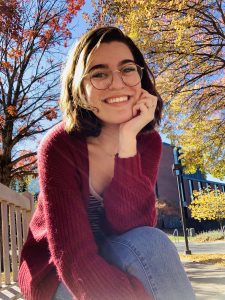Wordplay with Becca Lewis
Contact
The Words: Macalester's English Student NewsletterSenior Newsletter Editors:
Birdie Keller '25
Callisto Martinez '26
Jizelle Villegas '26
Associate Newsletter Editors:
Ahlaam Abdulwali '25
Sarah Tachau '27
By Kira Schukar ’22

This month’s featured author, Becca Lewis ‘21, started writing when she was in elementary school. “I’ve always been an imaginative person,” she says. “And, as an adult, I see no reason to let that part of me go.” As she got older, Becca’s stories never lost their creativity. When she writes fiction, she typically follows the style of magical realism. “I’m fascinated by normal worlds with one or two fantastical elements,” she says. “Though I’m starting to embrace more of that weirdness and am currently working on a semi-surrealist piece for my capstone.”
This month, Becca has chosen two short personal essays to share with The Words, titled “On Reality” and “On Board.” The staff of The Words thanks Becca for her creative and beautiful contribution!
On Reality
To bend reality and stretch its hide across blank pages is a feat for the strong minded. It is a feat I wish to accomplish, wish to build stamina for. Training like an olympian to wrestle convention, now that’s a sight for sore eyes, or perhaps sore muscles. I want to grapple the world and spin it on an axis untraversed, if there is such a thing anymore.
We study writers we consider “The Greats.” Shakespeare, Chaucer, Dickens, Twain. They’re household names. Familiar on principle, foreign in practice. The oxymoronic offspring of “timeless,” and “classic.” I want here and now, hell, I want hence and new. I want a dose of timelessness that sends me reeling forward, not spinning in muddy ditches deepened by time and time again.
My fascination lies in the slight alteration of what we know to be true, the rethrowing of reality onto the wheel and the pulling of its edges into something recognizable, but only just. My “Greats”—Atwood, Lewis, Morrison, King—they’re masters of this. They’ve loosened their grip just enough to let the world out at the hem, letting me breathe into the space between the fabric of reality and the begowned beast beneath it.
I find myself questioning the tangibility of those I consider great. How can people like Tolkein just exist, I once wrote in a paragraph of free written prose. I marvel at minds that can construct entire worlds and long for the moment mine will clear enough space to do the same. This is, as I’ve come to understand, the very beginning of being influenced, the falling victim to one-way, platonic seduction. To be met at the center point of your being by someone purely conceptual. To be seen but never looked in the eye. That’s it.
On Board
I was convinced of my being strictly a fiction writer until I read Ross Gay. “Tomato On Board” felt so simple, so human. The language was casual, the subject matter quirky-ordinary. I read it twice. I relished every word not because of any sort of underlying grandeur, but because they felt within my own capability.
Much of my writing that I consider “for myself” is writing like this: prosey, thought-riddled, often existential. I ask questions I can only hope to answer with even more questions, pepper in words for their sonic kiss, and type for longer than the writing requires just to hear the click of fingertip on key. I never considered that I could do this for an audience. You’re an essayist, a friend said to me over the phone, among other things, of course. The popularity of Book of Delights only reassured me that not only could I be, but I could be.
I reeled at the notion of writing essays. I have so much respect for an author who can make stream of consciousness something people take seriously, I commented in an English class. A class about influences, about imitating influences. Influenced imitations. That’s what this is, is it not? An imitation of an essay of an influence? The words are just magic, I think as I write this. The words are just magic.
So I got on board with the idea of writing essays, internalized my diagnosis of Essayist and prescribed my own course of action. Just write, a beloved professor once told me. Incredible advice. Ross Gay turned his thoughts into educated discussions, so why couldn’t I? Any reservations I had about having to abandon the flowery, melodic language of the fiction I adored writing melted at the realization that no such abandonment was necessary. I could write anything, hell, I could be less of an author and more of a human being. These were going to be my own thoughts, were they not? Why couldn’t I be more cerebral, more curious, more myself?
Maybe someday, someone young and lustful for loquaciousness will arrive at these pages and take them seriously. The words are just magic, she’ll say, and with all the luck in the world, they will be.